How to Set Up an Outdoor Buffet Table the Right Way
Help guests help themselves while streamlining your outdoor entertaining plan.
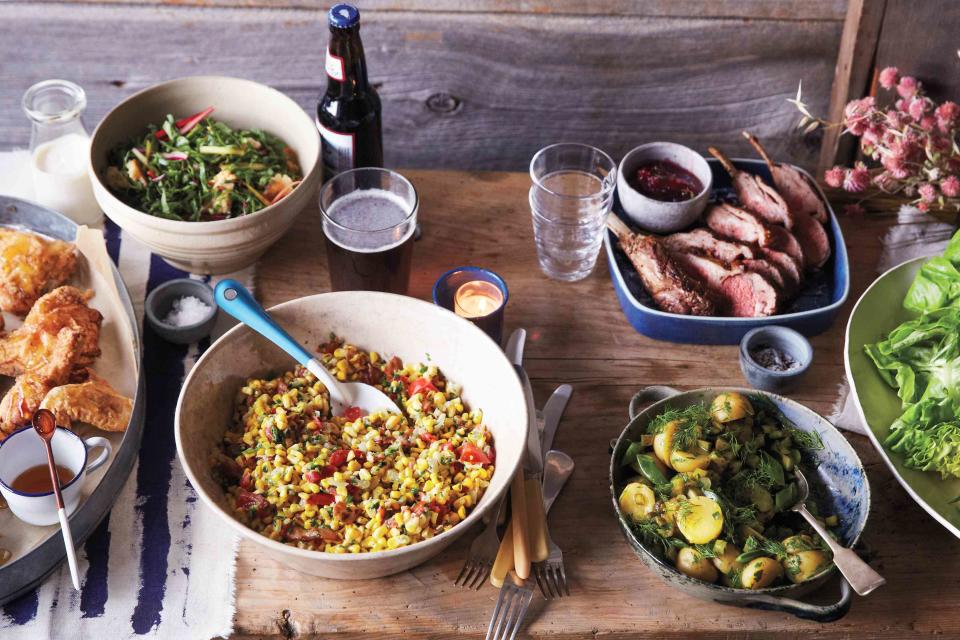
John Kernick
It's hard to time everything perfectly when you're feeding a crowd. That's why we love serving meals buffet-style, especially for outdoor parties where guests may not all sit together at the same time. But while planning a self-serve meal may be easier on you as the host, it means more work for your guests—especially if you don't set up your food service correctly. Loose silverware, foods out of order, and the wrong plates in the wrong place can leave your guests scrambling to complete (and enjoy) their meal.
"The better the buffet is set up, the better your guest experience will be," says event planner Kelly McWilliams. "A poorly set buffet will end up with long lines, overflowing plates—because guests didn’t know what was down the line—and the worst: food running out too quickly."
Stage your setup down to the last detail to create a simple, effortless experience for you and your party people with these expert rules.
Related: Use These Summer Menus to Inspire a Season of Fabulous Warm-Weather Meals
Where to Put Your Buffet Table
When choosing a spot for your buffet table, consider whether you're cooking nearby, where guests will be sitting, and your yard's sunny and shady areas. It's best to put the buffet table in a shaded spot about 20 feet away from both where your guests will be sitting and where anyone may be cooking. "You do not want your guests to have to walk too far with their plates, but you also do not want the line to be right next to where guests are sitting down to eat," says Alicia Smith, the executive chef of Cru Catering.
You don't want the grill smoke wafting toward guests while they're eating—or food left out uncovered in a too-sunny spot. "You do not want your food sitting with the sun beating on it," Smith says. "You either want an umbrella to cover the table, or to pick a shady spot, like under a porch."
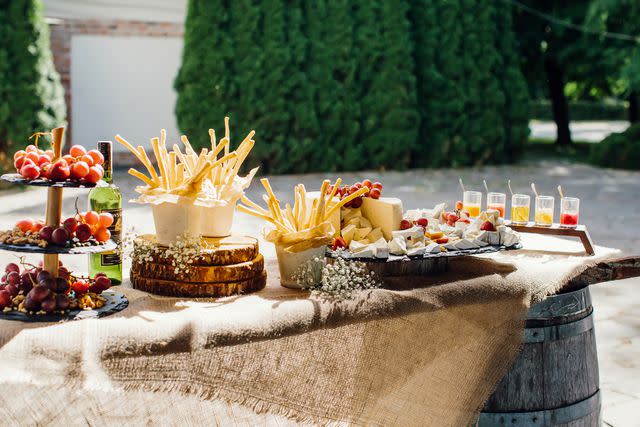
Ekaterina Bondaretc / GETTY IMAGES
Single-Sided vs. Double-Sided Buffet
Depending on your party's size, choose between a single- or double-sided buffet table.
Singled-Sided Buffet
A single-sided buffet table keeps traffic (that would be your guests) moving smoothly in the right direction—and it's a great option for smaller gatherings. Place your table up against a wall; you can leave a small walkway for yourself to sneak behind and refill the serving platters, but it should be clear that there's not room for guests to crowd around and serve themselves.
Double-Sided Buffet
For backyard parties with more than about 50 guests, Smith recommends a double-sided buffet (or two single-sided buffets). "If you have a larger guest count and only room to put one buffet table up, you can make the table double-sided, where guests can form two lines and serve simultaneously from each side of the buffet," says Smith. "If going this route, just make sure you have double the serving utensils."
If you prefer to set up two single-sided tables in lieu of a double, make sure both serve the same foods. "Guests could potentially get frustrated if they have to wait in two lines, as opposed to one line with all the offerings available to them," says Smith. "In general, if you are setting two tables, you will want to make them identical so that the lines can move through quickly and everyone has the same offerings."
Help guests plan ahead by posting the buffet's dishes on a sign nearby or on individual menu cards on the table. This way, "your guests know what to be on the lookout for," says McWilliams.
The Ultimate Buffet Table Order
From dishes and cold sides to condiments and utensils, here's how to strategically order the items on your buffet table.
First: Plates
Before your guests can serve themselves, they need a plate, and beginning your buffet with stacks of dishes also serves as a signal for the direction in which traffic should flow. Opt for entrée-sized plates, which give guests plenty of room to fill up.
Second: Cold Food
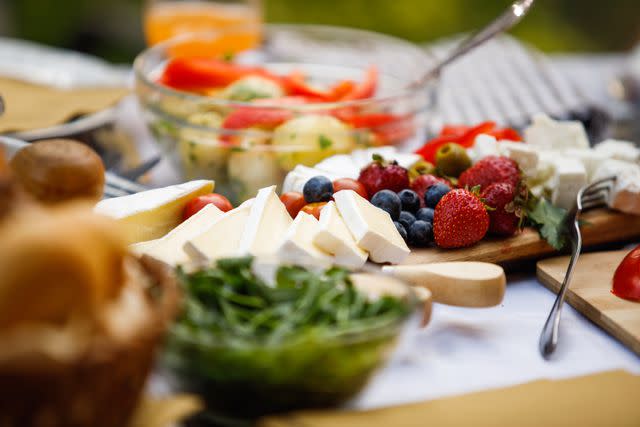
fotostorm / GETTY IMAGES
The first food items on your buffet should be green salads or cold salads, says Smith. "If you are not serving a salad or if you have room-temperature items, like grilled vegetables or fruit platters, these will go next, towards the front," she says.
Mix pre-dressed salads in batches to keep them fresh, swapping out empty bowls for just-tossed refills instead of keeping them outside on ice. "Other dressed items, like pasta salad or potato salad, will be fine refrigerated until you need to set your line and then they are fine sitting out," says Smith. "Just be mindful to not exceed an hour before either switching the dish or putting the dish back into the fridge."
Third: Hot Sides and Protein
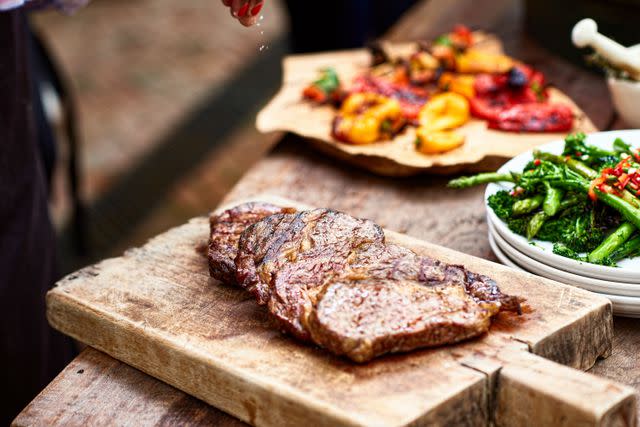
10'000 Hours / GETTY IMAGES
After cold sides, lay out hot sides, followed by the main protein, says Smith. Place all options in chafing dishes or pans with Sterno cans underneath. "If a protein has a sauce, you want to place that in front of the protein dish, so guests know that it is intended for that item," she says. "If there is cheese to sprinkle on pasta, you would also want to put that in front of that dish." Place serving utensils into the dish with the food, or leave them on bread-and-butter sized plates in front of each dish.
Skip the serving spoons: Tongs are the ultimate buffet serving utensil. They work for (almost) everything—including salads, sliced tomatoes, chicken cutlets, sausages, and other dishes.
Last: Silverware and Napkins
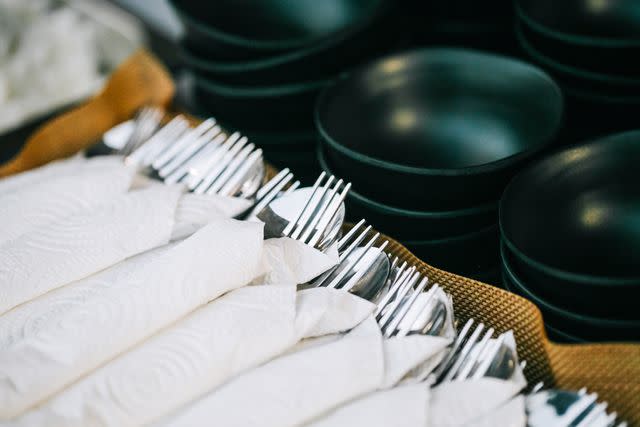
MR.WUTTISAK PROMCHOO / GETTY IMAGES
Instead of setting out a caddy of loose silverware, roll forks and knives (no spoons!) together in paper or cloth napkins. "Rolling the silverware with napkins is the best way to help with the flow on a buffet line," says Smith, who notes to always roll extra for guests who may go through the buffet a second time. "You want to put your silverware and napkins at the end of the buffet line as the last item for your guests to take—that way, they do not have to worry about carrying it with them while they are putting food on their plates."
You can also make it easier for guests to carry their plates by putting stacks of rolled flatware in the center of the dining tables at more causal parties, recommends McWilliams.
As Needed: Bowls and Spoons
In general, buffets don't require bowls or spoons. Rhe exceptions are soup and the occasional pasta dish, says Smith. "The bowl should go directly before the dish that it is intended for," she says. "If you are offering something that needs a bowl, have the spoons available to take at the end of your line."
As Needed: Condiments and Toppings
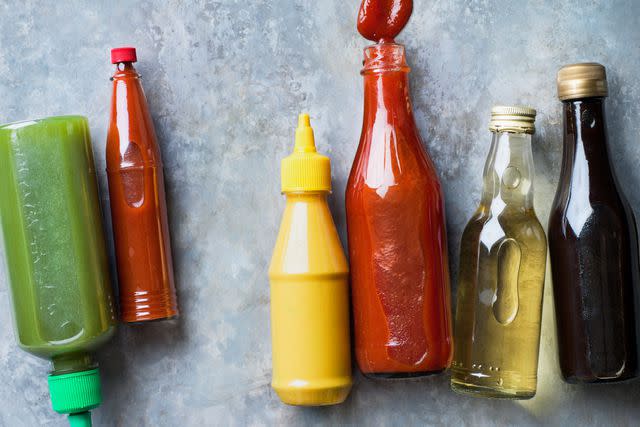
Your condiment, dressing, and topping placement should feel obvious and intuitive. If you are offering burgers and rolls separately, put the rolls right before the tray of meat; if guests are building their own deli sandwich, put bread before the tray of cold cuts. "All of the toppings will be staged after the protein: Lettuce, tomato, onion, ketchup, and mustard should all go after the guest has already taken their roll and their protein," says Smith. "This is the same idea with sandwiches or a taco bar."
At a casual party, you can keep condiments in their bottles. Decant into label-free glass bottles, bowls, or jars for a more elevated gathering, says Smith.
Where to Put Desserts on a Buffet Table
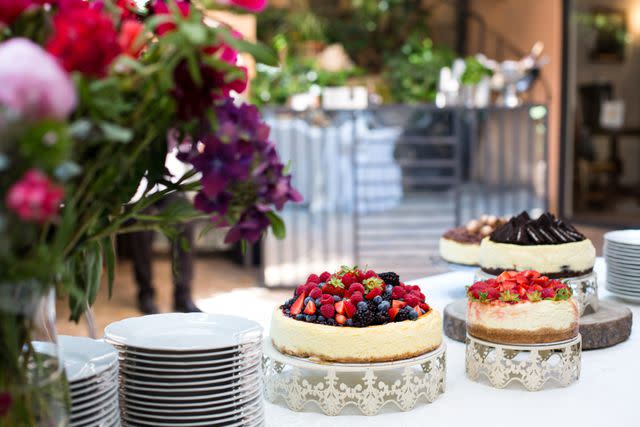
Kathrin Ziegler / GETTY IMAGES
A small dessert selection, like a tray of cookies or a plate of brownies, can go on the same table as the main meal (put them towards the end). Place a stack of small plates right before the desserts so guests can keep their sweets and savories separate if they prefer.
If you have room to accommodate it, a separate dessert station is easier to maneuver. "If you have the space, having a small table with desserts and small plates is ideal, so guests do not have to overwhelm their dinner plate while trying to also make space for the dessert, as well," says Smith.
Like with the larger tables, lay out plates—and bowls, if you're serving ice cream, mousse, or sherbet—first, followed by the food, toppings, and, finally, flatware and napkins. (No need to roll silverware for dessert: Not all guests will choose the same food, so it's easier for them to pick up only the fork or spoon they need.)
Related: 25 Refreshing Big-Batch Cocktails That Make Serving a Crowd Easy
Set Up a Separate Drink Station

Prevent a bottleneck or spills on the buffet by serving drinks in a different area. Arrange beer, wine, and nonalcoholic drinks along with plenty of ice and garnishes. If you plan to serve cocktails, they should be pre-batched—this is not the time to be shaking drinks one by one! Check out our sangria, punch, and cooler recipes for refreshing ideas. If you're serving brunch, a Bloody Mary bar is always a crowd-pleaser.

